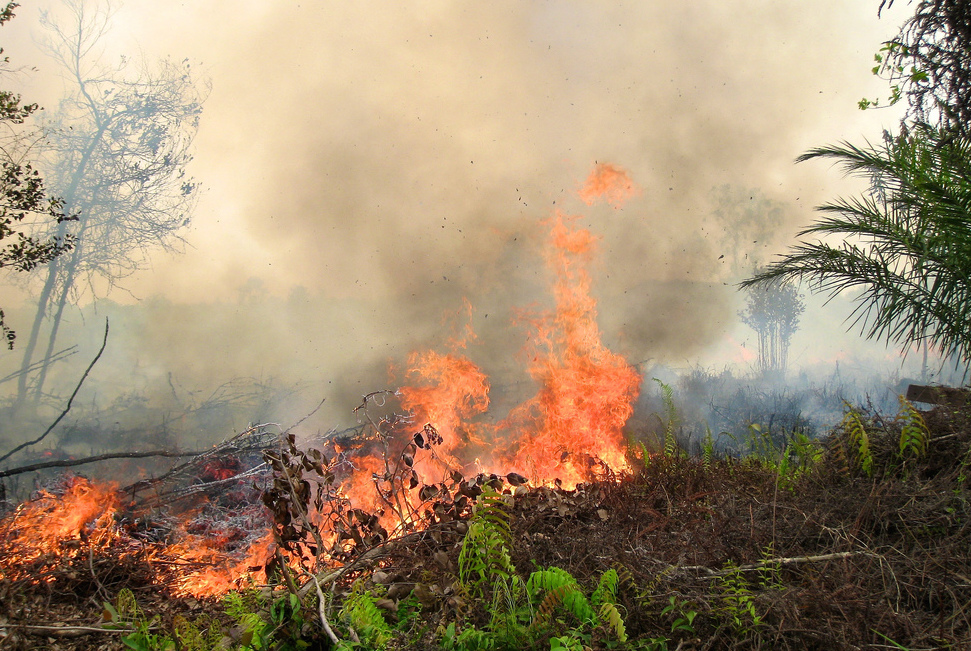When Indonesian President Joko Widodo prepared for his maiden visit to the U.S. this October, he had planned to visit California to woo investors from Silicon Valley. Instead, he had to cut his trip short because Indonesian forest and peatland fires were causing devastating air pollution across Southeast Asia. People in Indonesia, Malaysia, Singapore and Thailand continue to be victims of what scientist Dr. Erik Meijaard called “the biggest environmental crime of the twenty-first century.”
The fires were started by farmers who employ the slash and burn method to clear their land in preparation for the new planting season. The Indonesian government appears helpless to prevent and control the burning, which happens annually. Nothing underscores the inefficiency of Indonesia’s government agencies more clearly than the smoke that has plagued the entire region year after year. It also highlights the lack of property rights because some of the fires are being started to claim immediate control over publicly owned forestland.
Against this background of insufficient law enforcement, it is hard to believe that rules and prohibitions can solve Indonesia’s other environmental problems. Indonesia is home to 10% of the world’s tropical forests and 17% of the world’s coral reefs, but they are threatened by massive levels of deforestation, and more than 80% of the reefs are believed to be at risk.
While policing alone will not save Indonesia’s forests and coral reefs, conservation efforts do show some encouraging results. For example, an Indonesian national park announced in September that it had captured the first images of three newborn Javan rhino calves, raising hope for the survival of one of the world’s most endangered species.
On the other hand, it was also recently reported that a tiger poaching syndicate in Mount Leuser National Park involved official forest rangers who sold tiger skins – each of which can fetch up to 3,500 USD. If policing fails, then what is needed, instead, are policies that provide local communities with property rights, income opportunities, and the long-term incentive to protect the environment. In a recent study on Forest Ownership and Management in Indonesia, my collagues at the Center for Indonesian Policy Studies (CIPS), outlined policy recommendations for reducing deforestation by strengthening communal property rights.
Indonesian forests are 100% owned by the government. Recently, however, the government initiated the transfer of 12.7 million hectares of forests to the management of local and indigenous people. It is a step in the right direction because property rights are known to have resulted in remarkable reforestation efforts in Nepal, Niger, China, and Indonesia. What needs to follow is a general reform of the forestry ministry itself, which has to change its paradigm from policing the environment to facilitating the economic development of local communities.
Property rights and income alternatives are also crucial for the protection of coral reefs and forests. A recent study by maritime conservation expert Michael De Alessi mentions the private Wakatobi Dive Resort, which has signed agreements with 17 fishing villages and other government bodies around Tomia Island in the eastern parts of Indonesia. The agreements are built on traditional laws of local communities and have slowly started to change the attitude towards the reefs. Besides protecting the reef in front of the resort, a recent survey also reports that coral health in the entire area is improving.
The involvement of the private sector in conservation efforts is crucial, not just for conservation itself, but for providing alternative income opportunities to the local communities. In neighboring Malaysia, the 1998 privatization of tourism facilities in Kinabalu Park aimed to improve the livelihoods of local communities. According to UNESCO, the park remains in an excellent state of conservation, which cannot be said for Indonesian national parks. The head of the Mount Rinjani National Park in Indonesia reported in September that locals have cleared up to 50 hectares of conservation forests. The involvement of private tourism services appears to be a better solution than treating forests like museums.
Finally, with agriculture being the main cause of deforestation all over the world, Indonesia’s low-tech, extensive agriculture sector needs to take a fair share of the blame for deforestation. The Indonesian government has proclaimed food self-sufficiency a national target in strategic goods, like rice, sugar, corn, soy, etc. Related import restrictions prevent technological progress and push farmers to expand agricultural land into forest areas. In the Javanese district of Wonosobo, CIPS research* has shown links between the country’s restrictive trade policy and deforestation and severe land degradation.
President Widodo may have cut his US trip short to oversee efforts to extinguish forest fires, but extinguishing these fires only treats the symptoms. Much bigger challenges lie ahead when the government tries to overcome the root causes of these fires. This would highlight the urgent need for the enforcement of property rights, the reform and development of government agencies, the reduction of barriers to trade and technological progress, local economic development, and the inclusion of the private sector in conservation efforts. Only when these issues are tackled can Indonesia hope to effectively protect its natural environment.
*The Center for Indonesian Policy Studies is currently conducting a more in-depth analysis of the impact of restrictive trade policies on the environment in Wonosobo. That paper is going to be published early 2016.




